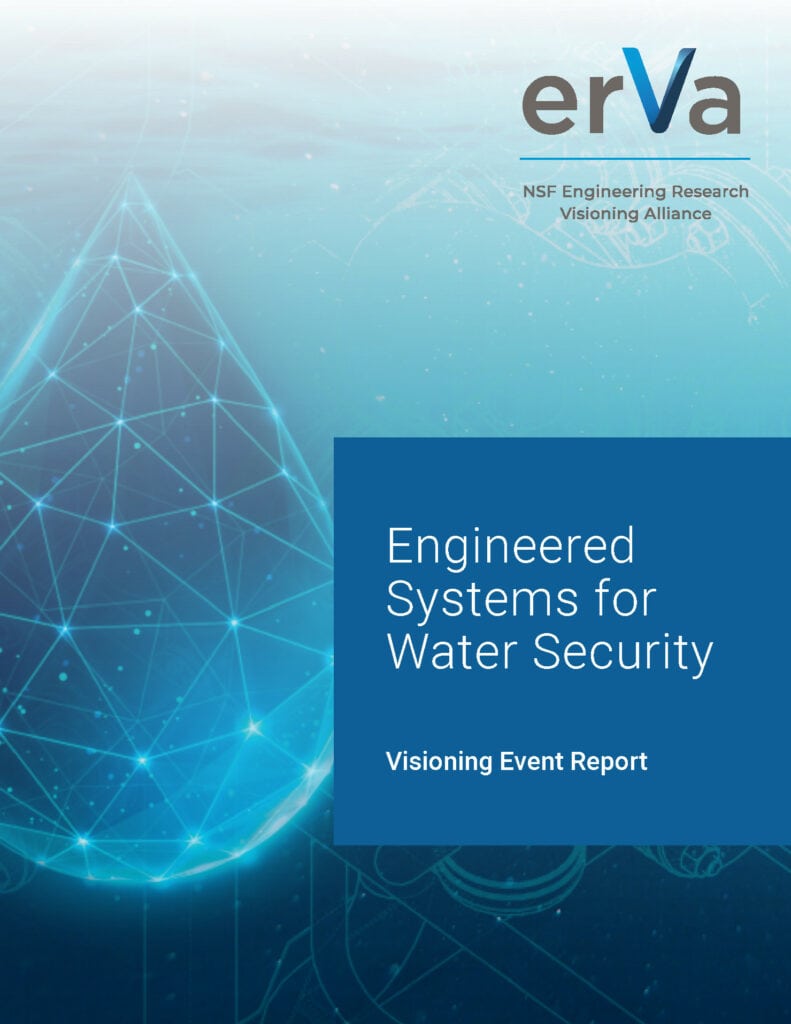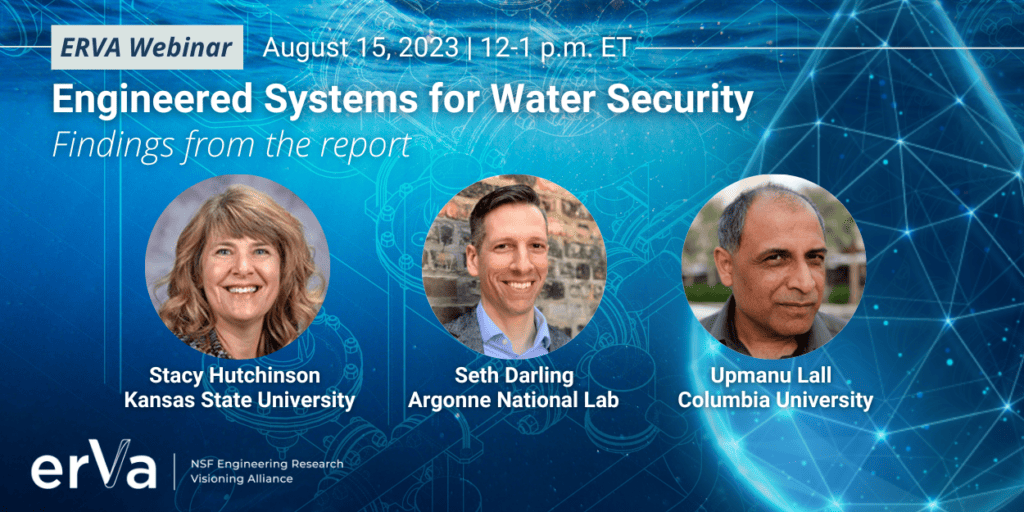
08•15•2023 @ 12:00 pm - 1:00 pm
Join ERVA and our Engineered Systems for Water Security visioning event chair for a webinar to discuss the findings of the recently released report.
The Engineering Research Visioning Alliance will host a webinar August 15, 2023 at 12 p.m. EDT, to discuss the findings of ERVA's report, Engineered Systems for Water Security. The event will feature Stacy Hutchinson, associate dean for research and graduate programs, Kansas State University; Seth Darling, chief science & technology officer for advanced energy technologies, Argonne National Laboratory; and Upmanu Lall, director of the Columbia Water Center and the Alan and Carol Silberstein Professor of Engineering at Columbia University.
This webinar will discuss the key research directions identified as a result of this visioning event and subsequent report.
This is an informational webinar with an opportunity for Q&A with the speakers at the conclusion of the panel discussion. Participation is welcome and encouraged. This webinar is free to attend, however registration is required.
Engineering Research Visioning Alliance’s (ERVA’s) latest report identifies engineering research priorities to address the complex issue of water security
July 13, 2023 – As drought, aging infrastructure, and increased demand strain access to adequate water for agriculture, manufacturing, and community use, developing strategies for a future with water security in mind is more important now than ever. That is why the Engineering Research Visioning Alliance (ERVA), an initiative funded by the U.S. National Science Foundation (NSF), has published a new report, Engineered Systems for Water Security, with critical research directions identified during a visioning session that convened engineering researchers in February 2023. The executive summary and full report can be found on ERVA’s website.
“Water is the essence of life, but our infrastructure around it is often disjointed and in disrepair,” said Stacy Lewis Hutchinson, associate dean for research and graduate programs at Kansas State University and chair of the thematic task force that developed the ERVA report. “The severe stress we’re seeing on water resources by warmer temperatures and overuse call for an ‘all-in’ effort by society to develop solutions to ensure future water security. Engineers, as designers and builders of the future, must take the lead and catalyze new research to enable water security.”
Hutchinson will moderate an expert panel during a public webinar to discuss the findings from the report on Aug 15 at noon EDT. See details and register for the webinar.
The report summarizes five key research priority areas for the engineering profession as it looks to secure and modernize our water security system:
- Increase affordability, reliability, and scalability of future components of water systems for unit operations, including membranes, sorbents, and sensors to aid in water harvesting, contaminant detection, and treatment;
- Create affordable, reliable, and scalable technologies to visualize, maintain, and track physical components and water infrastructure processes;
- Build new, resilient, and adaptable infrastructure with the flexibility to opportunistically integrate legacy systems;
- Improve data gathering and analysis and leverage predictive modeling and data-informed operations for daily systems to long-term management, maintenance, and integration of water systems (drinking water, wastewater, stormwater, natural water resources);
- Develop, test, and implement a water management framework that considers the nexus between engineered, natural, and human systems.
The report specifically discusses the importance of recycling rainwater into water for other uses, given the cycle of flooding and droughts in many locations. As with all ERVA reports, the findings also emphasize the importance of working with communities to meet their needs and concerns while building out better infrastructure.
Engineered Systems for Water Security is the fifth report released by ERVA, an initiative funded by the NSF to help identify future engineering research directions. Visit ERVA’s website to visit the previous reports: Sustainable Transportation Networks Engineering, R&D Solutions for Unhackable Infrastructure, Leveraging Biology to Power Engineering Impact, and The Role of Engineering to Address Climate Change.
ERVA is funded by an the National Science Foundation.
About The Engineering Research Vision Alliance (ERVA):
The Engineering Research Visioning Alliance (ERVA) is a neutral convener that helps define future engineering research directions. Funded by the NSF Directorate for Engineering, ERVA is a diverse, inclusive and engaged partnership that enables an array of voices to impact national research priorities. The five-year initiative convenes, catalyzes and enables the engineering community to identify nascent opportunities and priorities for engineering-led innovative, high-impact, cross-domain research that addresses national, global and societal needs. Learn more at www.ERVAcommunity.org.
The Engineering Research Visioning Alliance hosted a webinar on August 15, 2023 at 12 p.m. EDT, to discuss the findings of ERVA's report, Engineered Systems for Water Security. The event featured Stacy Hutchinson, associate dean for research and graduate programs, Kansas State University; Seth Darling, chief science & technology officer for advanced energy technologies, Argonne National Laboratory; and Upmanu Lall, director of the Columbia Water Center and the Alan and Carol Silberstein Professor of Engineering at Columbia University.
The webinar discussed the key research directions identified as a result of this visioning event and subsequent report.
More than 50 experts convened in Knoxville over two days to prioritize bold, new engineering research directions to advance the future of distributed manufacturing
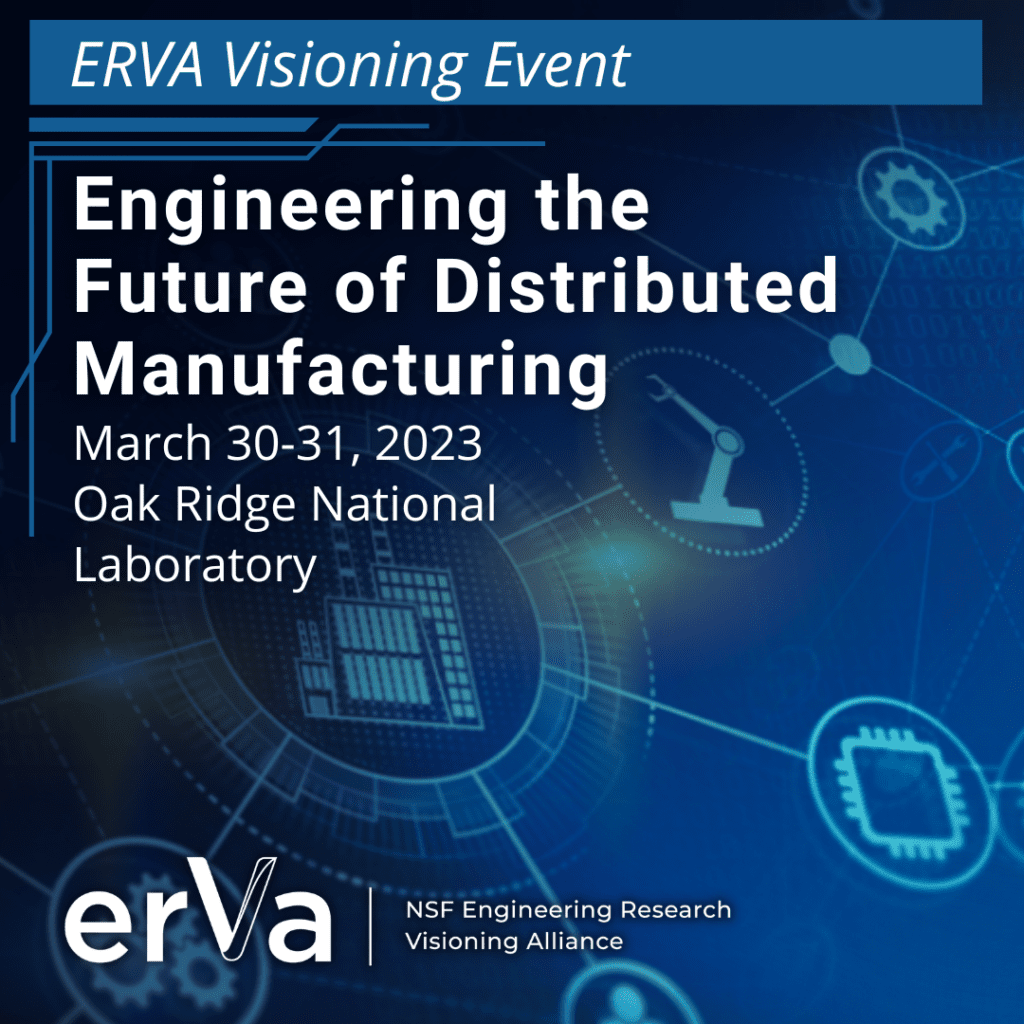
A competitive U.S. manufacturing sector must merge the digital and physical worlds and leverage new materials and processes to improve productivity and agility. It will take investment now in research and development to set the stage to revitalize manufacturing in the coming decades. The engineering research priorities to enable a thriving future for distributed manufacturing were the focus of a two-day visioning event convened this week by the Engineering Research Visioning Alliance (ERVA), a U.S. National Science Foundation-funded initiative.
More than 50 researchers and technical experts from academia, industry, nonprofits, and national laboratories met in Knoxville, TN, to ideate and articulate the technical challenges to create products and tools for distributed manufacturing anywhere, anytime, any place, and in any quantity. This is the democratization of distributed manufacturing, which promises to harness technical advances in data, real-time measurement, automation, and machine learning for manufacturing expansion, resulting in increased productivity and economic growth.
“The lingering supply chain and workforce effects of the pandemic, along with the current geopolitical landscape, pull back the curtain on the national security risks the United States faces because of reliance on other nations to supply our production and manufacturing needs,” said Charles Johnson-Bey, ERVA co-principal investigator and senior vice president at Booz Allen Hamilton. “This event brought together a diverse group of the brightest minds in the nation to address the democratization of manufacturing that will enable small and medium manufacturers, which represent 98% of U.S. companies, to capture up to $500 billion of new manufacturing business and reduce the U.S. reliance on external capabilities.”
New engineering R&D will be integral to the design, application, and expanded use of technical solutions for efficient, effective distributed manufacturing. The goal is a manufacturing ecosystem dispersed across geography but connected digitally to the expertise and resources needed to keep machines running effectively by a new generation of manufacturing knowledge workers. The ERVA visioning session catalyzed creative, bold thinking and gathered future-focused research ideas from innovators and researchers in a range of specialty disciplines. Johnson-Bey worked with a Thematic Task Force representing high tech and manufacturing from across sectors—university, industry, and national labs. The task force structured the proceedings over two days to identify research priorities in three topical areas: materials; tools, systems, and processes; and data analytics and quality assurance. Participants recommended bold new research directions at the exploratory research edge and with the potential for significant societal impact.
ERVA visioning events are an unparalleled opportunity for selected participants to scope engineering approaches to address societal challenges, conceptualize future solutions, and prioritize use-inspired research for long-term global impact. The event was a unique opportunity for an open exchange of futuristic ideas shared from diverse perspectives.
ERVA provides the engineering community with a process for identifying bold and societally impactful engineering research directions that will place the U.S. in a leading position to realize a better future for all. It is an engaged, inclusive, multilayered partnership, providing a diverse array of voices with the opportunity to impact national research priorities. Event participants were identified and invited based on their research and expertise and represent scientists across academic disciplines, geographic location, organization sector and type, gender, race/ethnicity, and career stage.
The results of the proceedings will be distilled and disseminated via a report identifying priorities for engineering researchers to pursue with the goal of enabling new processes and technology to advance distributed manufacturing.
Learn more about this visioning event and the work of the thematic task force, and sign up to receive updates and the results report.
About ERVA
The Engineering Research Visioning Alliance (ERVA) is a neutral convener that helps define future engineering research directions. Funded by the National Science Foundation (NSF) Directorate for Engineering, ERVA is a diverse, inclusive and engaged partnership that enables an array of voices to impact national research priorities. The five-year initiative convenes, catalyzes and enables the engineering community to identify nascent opportunities and priorities for engineering-led innovative, high-impact, cross-domain research that addresses national, global and societal needs. Learn more at www.ERVAcommunity.org.
Follow ERVA:
LinkedIn: https://www.linkedin.com/company/ervacommunity
Twitter: https://twitter.com/ervacommunity
Facebook: https://www.facebook.com/ERVAcommunity
Read the summary and watch the recording
On Jan. 30, 2023, a Virtual Town Hall convened by the Engineering Research Visioning Alliance (ERVA) explored the topic of Engineering Research Solutions for Water Events: The Recent California Floods. The event featured the expertise of University of California Irvine professors David Feldman and Brett Sanders and was moderated by Anna Gemolas of DuPont Water Solutions.
The event was motivated by extreme weather events in the month preceding it. Heavy rains triggered flooding, power outages, and over 700 landslides; these events have caused at least 20 deaths and over $1 billion in damages.[1] Climate change makes extreme events—drought cycles and severe flooding—increasingly likely, and its role in recent California rain events is the subject of current investigations. However, it is clear that global warming leads to more water vapor in the atmosphere, playing a key role in catastrophic rain events.
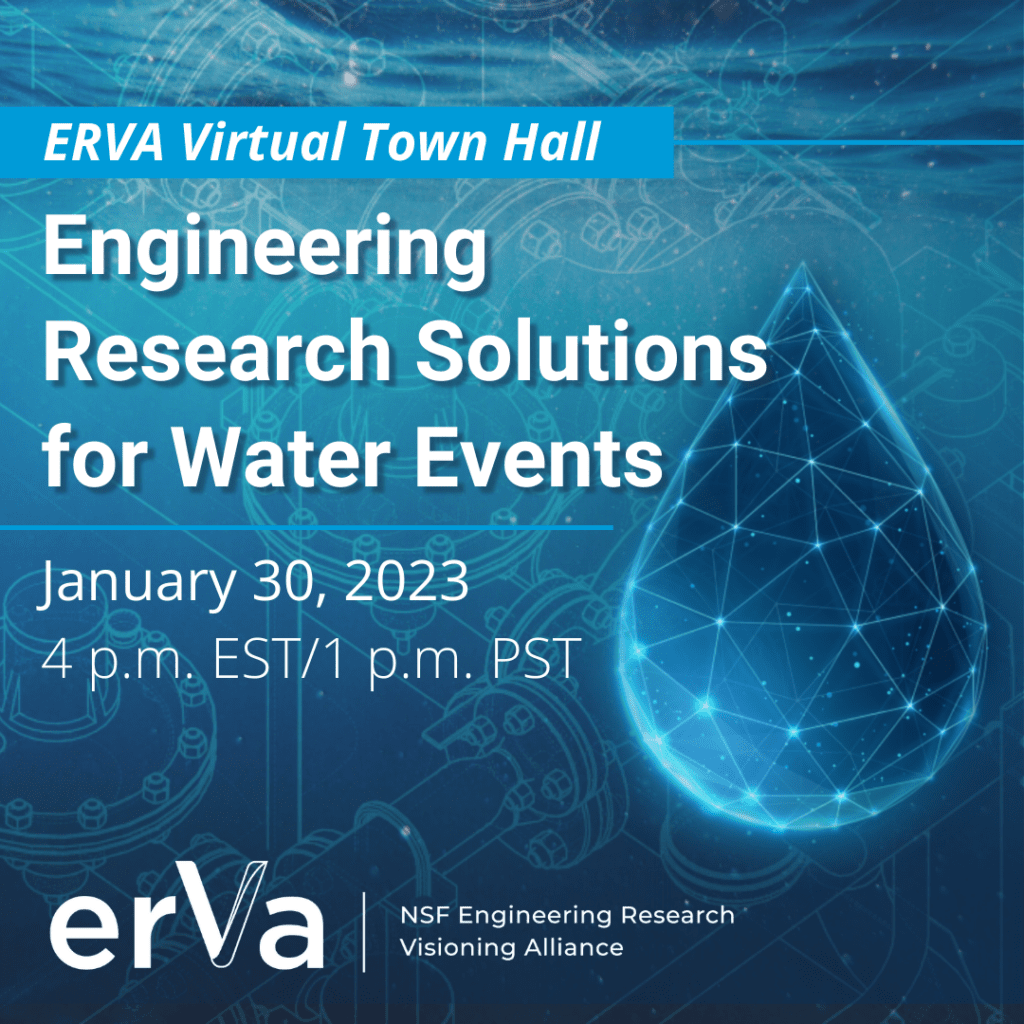
California and other sites of such events face the reality that stormwater from these floods is not systematically captured or stored to address future needs. This is a concern as California and other Western U.S. states were scorched by drought for much of 2022, and an overarching megadrought has had its grip on the West for over 20 years.[2] Stormwater is a challenge as it can be both a potential resource and a pollutant. Although the science of pre-treatment in runoff is well-known and established, adjoining communities must agree to accept water that potentially impacts both managed systems, even if they have different standards for health and environmental protection. Users must reach common ground on water end uses and regulatory standards. Stormwater management is exacerbated by the limited time available in some areas to capture and store it—and the intended use/treatment of the captured water— for example, landscaping that would not compete with drinking water. A mix of green infrastructure (e.g., swales for infiltration) and gray infrastructure (e.g., cisterns, distributed treatment systems) will be needed. Innovative engineering solutions must be developed and implemented to mitigate damage from flooding and capture water from future events for community use if we hope to benefit from these events.
Town Hall panelists considered the causes of these disasters, challenges to rebuilding and re-envisioning infrastructure, and ways stormwater can be harnessed for community benefit. They also discussed how digital tools, including simulation technologies, could assist in effective stormwater management. Download the full summary and watch the recording below.
[1] Masters, J. (2023, Jan. 27). Climate change is increasing the risk of a California mega flood. Yale Climate Connections. Retrieved Jan.30, 2023 from https://yaleclimateconnections.org/2023/01/climate-change-is-increasing-the-risk-of-a-california-megaflood/.
[2] Thomson, J. (2023, Jan. 6). Is California still in a drought? Newsweek. Retrieved Jan. 31, 2023, from https://www.newsweek.com/california-drought-still-climate-change-rainfall-1771800.
More than 100 experts convened virtually over two days to prioritize bold, new engineering research directions in water security
Feb. 2, 2023 — Disastrous California flooding and contaminated municipal water system failures underscore the urgent need to transform aging, fragmented systems and create a new paradigm for water stewardship and affordable access for all. The engineering R&D required for water management and security was the backdrop for a two-day virtual visioning event convened this week by the Engineering Research Visioning Alliance (ERVA), a U.S. National Science Foundation-funded initiative.
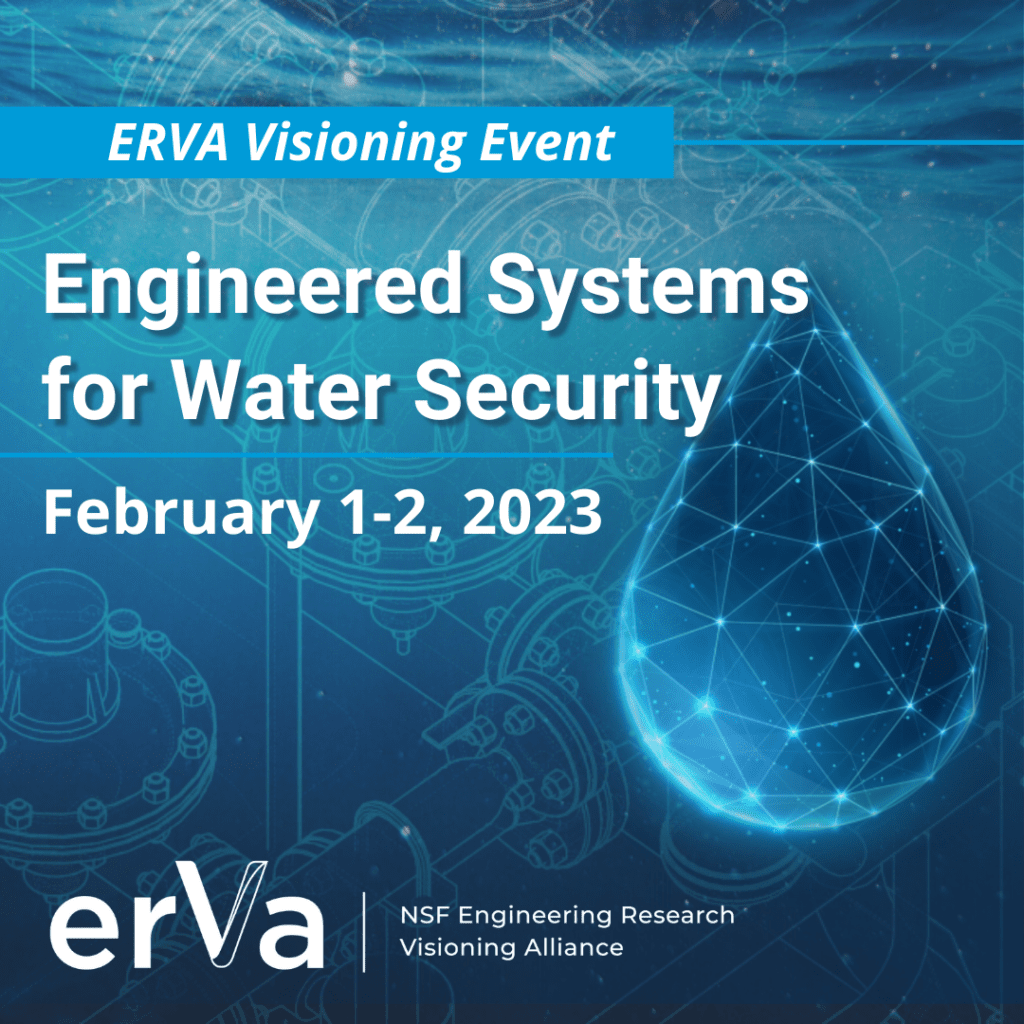
More than 100 researchers and technical experts from academia, industry, nonprofits, and national laboratories convened to explore knowledge gaps and identify research priorities to enable technical solutions for future water management systems. Affordable access to water for people, industry, and the natural world requires a new system-of-systems approach and collaboration across different sectors, including government, industry, academia, and civil society.
New engineering R&D will be integral to the design and implementation of the technical solutions to support the integration and interoperability of different water management systems. The ERVA visioning session catalyzed creative, bold thinking and gathered future-focused research ideas from innovators and researchers in a range of specialty disciplines. Stacy Lewis Hutchinson, associate dean for research and graduate programs and professor of biological and agricultural engineering at Kansas State University, chaired the event’s thematic task force and serves on ERVA’s Standing Council and Executive Committee. The task force structured the proceedings over two days to identify specific areas of unexplored research or those at the research edge and with the potential for significant societal impact.
“The ERVA platform provided a tremendous opportunity for this outstanding group of experts to come together and discuss the security of our most valuable resource,” Hutchinson said. “Bold thinking lays the foundation for transformational engineering research that will ensure our secure water future.”
ERVA visioning events are an unparalleled opportunity for selected participants to scope engineering approaches to address societal challenges, conceptualize future solutions, and prioritize use-inspired research for long-term global impact. The participants considered issues across water use and management—from how people use and access water to industry and environmental factors.
Sustaining well-being and livelihoods, enabling economic development, and safeguarding against contamination and water-related disasters are among the goals for future water security. Planning and managing water systems for the future must include strategies that account for as yet unknown technical development that will affect people, safety, affordability, and equitable access.
“I was most impressed by the free and open exchange of ideas across a range of perspectives on water security,” said Pramod Khargonekar, ERVA co-principal investigator, distinguished professor of electrical engineering and computer science and vice chancellor for research at the University of California, Irvine. “ERVA brought together creative minds to develop exciting, compelling visions for engineering research to bring about a transformation about how we approach water security goals.”
ERVA provides the engineering community with a process for identifying bold and societally impactful engineering research directions that will place the United States in a leading position to realize a better future for all. It is an engaged, inclusive, multilayered partnership, providing a diverse array of voices with the opportunity to impact national research priorities. Event participants were identified and invited based on their research and expertise, and represent scientists across academic disciplines, geographic location, organization sector and type, gender, race/ethnicity, and career stage.
The results of the proceedings will be distilled and disseminated via a report identifying priorities for the future of engineering. The report will include high-value findings that delineate less-explored, basic, and use-inspired lines of research ripe for the engineering community to pursue.
Learn more about this visioning event and the work of the thematic task force, and sign up to receive updates and the results report.
About ERVA
The Engineering Research Visioning Alliance (ERVA) is a neutral convener that helps define future engineering research directions. Funded by the National Science Foundation (NSF) Directorate for Engineering, ERVA is a diverse, inclusive and engaged partnership that enables an array of voices to impact national research priorities. The five-year initiative convenes, catalyzes and enables the engineering community to identify nascent opportunities and priorities for engineering-led innovative, high-impact, cross-domain research that addresses national, global and societal needs. Learn more at www.ERVAcommunity.org.
Follow ERVA:
LinkedIn: https://www.linkedin.com/company/ervacommunity
Twitter: https://twitter.com/ervacommunity
Facebook: https://www.facebook.com/ERVAcommunity
